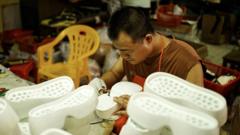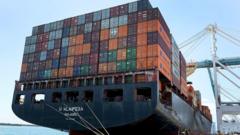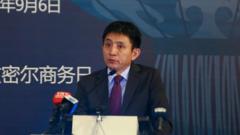Chinese small businesses are reeling from the impact of President Trump’s enduring tariffs, resulting in halted production and excess inventory. The trade war’s toll extends to workers and factories alike, with uncertainty clouding their future.
Tariffs Grind Chinese Small Businesses to a Halt Amid Uncertain Future

Tariffs Grind Chinese Small Businesses to a Halt Amid Uncertain Future
Small businesses in China face existential threats as U.S. tariffs persist, leading to halted production and piled-up goods.
The trade tensions ignited by President Donald Trump's persistent tariffs are leaving small businesses in China in dire straits, with many suspending operations entirely. "Every day feels harder," laments Lionel Xu, whose company, Sorbo Technology, specializes in mosquito repellent kits once popular in U.S. stores like Walmart. Currently, these products are languishing in warehouses, their future contingent on a potential reversal of the 145% tariffs imposed on Chinese imports.
"Without changes, we face a troublesome path," Xu articulately expresses his concerns about the factory's fate under Trump's tariff regime. Other small entrepreneurs voice similarly harrowing experiences at the bustling Canton Fair in Guangzhou where the vibe is palpably tense. Amy, another attendee, reports halting her production line completely due to the tariffs affecting U.S. buyers.
The trade friction has put a stranglehold on thousands of businesses, with many products rendered too costly for American consumers. Last week, Trump did temporarily lift some tariffs triggered by market turmoil, yet the burden on Chinese imports remained stringent, leading to reciprocal measures from Beijing, which imposed its own levies.
With a plethora of goods at the fair ranging from domestic appliances to lifestyle products, this trade war looms larger than ever over both nations' economies. As a considerable cache of exports sits at a standstill, the implications will ultimately trickle down to U.S. households, facing escalated prices for everyday items.
While the Chinese government maintains its hardline stance, committing to weather this trade storm, it is gradually becoming evident that their economy heavily relies on exports. The bustling workshops in Guangdong depict a different narrative: workers are already feeling the sting, some forced to accept significantly reduced wages as economic strains tighten their grip.
Amid the uncertainty, some manufacturers look to new avenues, hoping for growth opportunities outside the U.S. market in places like Europe, Saudi Arabia, and Russia. Yet, an undercurrent of frustration and tension surfaces as local entrepreneurs reflect on their future prospects, wary of the unpredictable strategies from both Washington and Beijing.
As talks between the two powers stall, one thing is clear: the landscape for Chinese businesses is shifting, as many grapple with the harsh realities of a world where the American market may no longer hold the initially enticing promise.






















